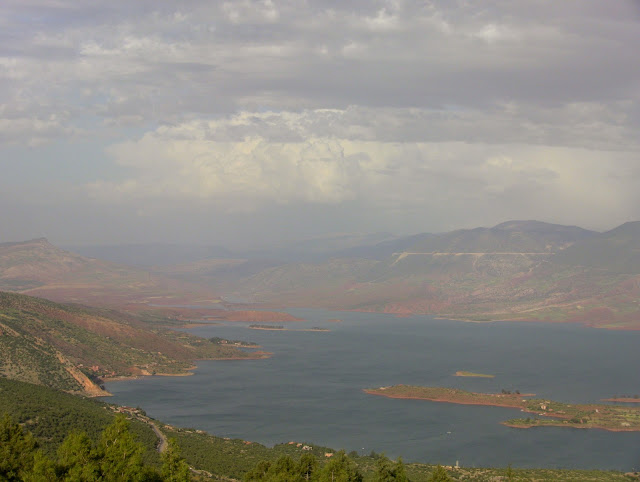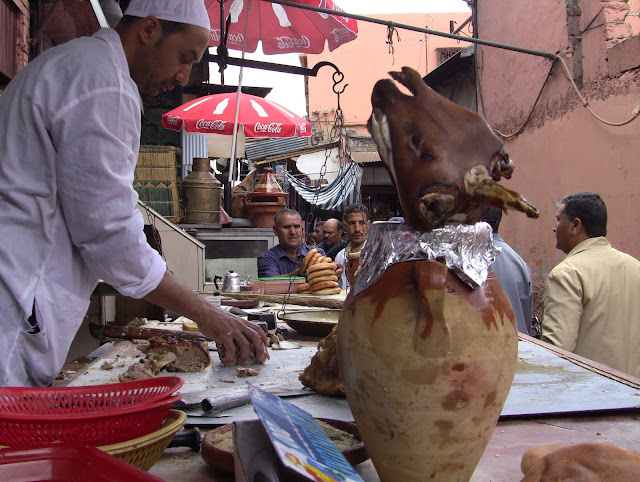I’m starting this post from my second-class seat on the oncf
train from Casablanca to Marrakech. The air inside the car feels as if it’s
been inhaled and exhaled far too many times already, and the humidity is giving
me that hot, claustrophobic itch just under my skin. My armpits are sticky, I
have the awkward, telltale dark line around my chest that all overly endowed
girls experience when things get a bit too warm. The trip is three hours total,
but Mike and I spent the first 40 minutes or so sitting on the floor in the
bumpy compartment between trains where folks lucky enough to have gotten seats
keep their luggage. Folks who missed out on the seats don’t give up their
luggage to the racks, though. They prefer to use the precious bit of cushioning
to ease the pain in their asses that the mad jangling of the train engenders.
After the stop at the first main town we reassessed our
situation. We were happy to find that passengers who had disembarked the
rumbling beast had left a few empty places behind. We were able to scramble into a couple of the
still-warm seats before the next throng of people boarded, desperately bumbling
around the narrow passages in search of seats of their own. Second class
differs from first class in that the company limits the amount of first-class
tickets it sells. You know, actually limits it to the number of seats it
provides. There is also air-conditioning, and in Morocco, air-conditioning is
very much appreciated. Second-class seats are just as good, but it’s a “fend
for yourself” environment, and the company sells far more tickets than it can
provide seats for. It’s very much like a metro in this regard. A three-hour,
hot, clammy metro ride.
I enjoy looking out windows in trains. I also enjoy looking
at the tops of heads poking out over the tops of seats. The top of the head in
front of me is covered with the olive green hood of a djellaba. Djellaba The arm of a small girl extends up over the seat and the fingertips tense out
and curl under as she tries to stretch her cramped spine. The top of her hand
is covered with brown marker in an attempt to mimic the henna art seen so often
in Morocco. Henna The olive hood turns every now and then, and I glimpse the elaborate braiding
adorning the sides, and the copper skin of the Moroccan man inside. He seems to
enjoy looking out windows nearly as much as I do.
Seated opposite of the Moroccan girl with the navy blue
sleeve and the amateur henna is a serious looking man wearing a black and white
striped turban. His eyes are closed and his head has sunk down to his broad
chest in either fatigue or heat stroke. Two black earbuds are inserted into
each dark ear, and he seems to be very much resigned to his fate of spending
the next hour onboard an overcrowded, delayed oncf train.
“I’m going to die,” Mike mutters uncomfortably as he flips
through his solar installation instruction manual for the nth time this
trip.
A boy sits next to the man in the striped hat. He wears a blue,
white and black baseball cap splashed with English words that I can’t quite
make out without appearing to stare. I like to look, but I never like looking
like I’m looking. The boy leans up against the window and cradles his left
cheek in his left palm, covering his eye and shielding his face from the hard,
hot train window. He tries to sleep, but appears to be very unsuccessful in
this endeavor as he keeps shifting his sit-bones uncomfortably every couple
minutes or so. His left eye is covered by his cradling hand, but his right eye
is closed underneath the heavy shadow cast by the boy’s very prominent black brows.
The train is moving again. Each stop takes an unreasonable
amount of time, because many of the doors are jammed. People can’t exit
properly and the aisles are hardly wide enough for one to pass through at a
time. Add the luggage and the size of the average Moroccan (sugar and bread and
couscous doesn’t do much for the figure), and you have a traffic jam of
colossal proportion.
We have one more hour.
A Muslim family sits across the aisle from the boy up
against the window. A small boy stares at me with his curious brown eyes as he
leans up against the armrest of his green and dirty brown striped seat. He will
be an exquisitely handsome young man when he grows up, with his sparkling eyes,
his happy mouth and his already strong jawline. He switches between staring at
me as I write and sucking on his fingers. His blue coat is quite becoming, and
I enjoy the grasshopper green color of the belt that keeps his jeans firmly
secured to his thin waist. I smile at him. He continues to stare. Perhaps he’s
making notes like mine in his mind. “A girl with short hair and a Moroccan
scarf is sticking out her lip (I always stick out my lower lip when I write)
and giving me strange looks. I wonder what she’s writing about.” He raises his
eyebrows and creates four deep wrinkles in his forehead.
I love wrinkles. Footprints of the face.
I can see a hand and the Taguia of the man (I assume to be
his father) sitting next to the sparkly-eyed boy. The hand is pale (for a
Moroccan) and bulging with green veins. It rests gently on beige linen pants,
and I get the impression from the relaxed fingertips that this lucky fellow has
actually managed able to drift off into sleep. I could be very happy for him,
but the selfish side of me just hates him a little for being able to escape the
perils of riding second-class oncf. His taguia is white with green and gold
embroidery encircling the footstool shaped hat. The top has an intricate green
design that comes together to form some sort of flower, but I’m not sure
what. His face is full of wrinkles. Deep
wrinkles that seem to be raised skeptically even in sleep. I wonder what his
dreams are like.
A woman sits across (I assume the wife and mother), but I
can only glimpse a black leg, the bottom of a long, brilliant blue shirt, and a
black headscarf with just a bit of dark brown hair shyly peaking through. Her
phone bursts into a sharp, obnoxious ring, and she answers quickly enough to
avoid accruing accusing stares from nearby passengers. Her voice is quiet and
soft, and I catch a few words in French before she hangs up the call.
Okay. Enough impressions.
Mike and I are on our way back from a relaxed, family
oriented trip to Casablanca. The last time we were here, business was the main
purpose, and we didn’t get to spend a whole lot of time with his friends and
family. This time, I was able to meet his mother, his cousin, his nephews, and
spend an evening with Sebastian and two of Sebastian’s friends from work.
Sebastian’s family owns a jewelry shop called Azuelos in the famous Morocco
Mall. The friends from the adjacent shop worked at Louis Vuitton.
Have I mentioned just how nice this mall is?
 |
| Outside the mall |
I had interviewed Sebastian at the Sofitel Hotel in
Marrakech, and he seemed to enjoy and support the project. So when Mike and I
arrived at his bijouterie yesterday afternoon, he immediately set up an
interview with one of the employees at Azuelos – a beautiful young woman named
Virginia. The interview was fast, fun, and she told me that the process was
“therapeutic”. This is something I love to
hear. I was also able to interview
Mike’s outgoing, good-hearted mother this morning before we left for Marrakech,
so that makes nine interviews in Morocco thus far. As my goal is to record one
interview per week, I already have all the interviews I need from Morocco. The
more the merrier, though, and Mike has promised me an interview with a friend
of his (the most beautiful girl I’ve ever seen) who teaches Tai Chi and voice
at a nearby art studio. After interviewing Kenza, I’ll probably contact a couple more couchsurfers and see if I can generate any interest.
The final note for today’s post: At the restaurant where
Mike and I joined Sebastian and his Louis Vuitton friends for an after dinner glass of wine (we'd already eaten at a kosher grill), I was told,
“You have to use the restroom. But
make sure to ask for the ocean view. This is very important.” When Mike told me
to ask for the ocean view, part of me just expected some ocean painted
wallpaper, or that the theme of the bathroom would be “ocean.” You know, with
shell-shaped soap dispensers and sea-foam hand towels.
Nope. I took a pee whilst looking out at the Atlantic through
sliding door sized bathroom windows. I never knew sitting on a toilet could
feel so romantic. The tea candles helped.



















































